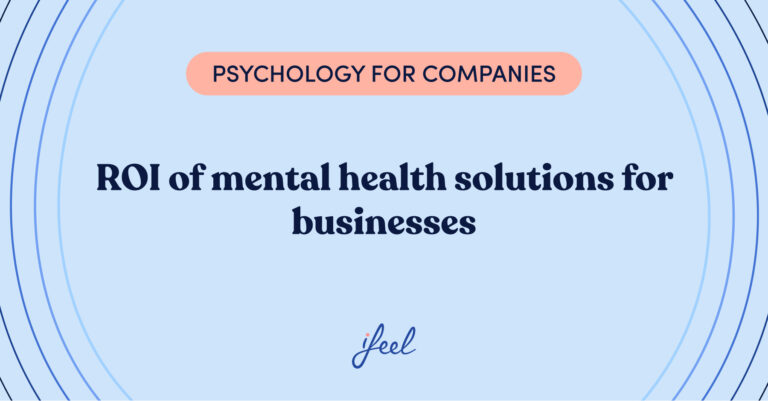The working mother’s guilt is something very common, judging by the daily experience of many women. In fact, it seems that guilt is an emotion that is attached to motherhood in our culture, certainly to a greater extent than to fatherhood. If women spend less time at home with their children due to work, they experience a greater sense of guilt than men who do the same. In this post, we talk about a topic that has a great influence on the psychological well-being of many women and that has a direct relationship with their professional development.
Working mother’s guilt
Sometimes, in the most extreme cases of the working mother’s guilt, what exists is an excessive dependency on behalf of the mother with the child. This goes beyond the time occupied by her work and extends to all situations of daily life.
As a result, the feeling of guilt appears in any circumstance in which the child is not in her company. These are cases in which the adult, for example, the mother, is not capable of being separated from her child or leaving him or her in the care of anyone else. Otherwise, she develops a strong uneasiness or concern for the well-being of the child and an enormous mistrust towards any care pattern that does not strictly pass through her direct supervision.
In other cases, more common and also less worrying in terms of the mother’s psychological health, guilt may not appear, for example, when the child is at school, doing what he/she has to do. However, the working mother’s guilt does appear, precisely, when the child is spending its “free time” and the mother is not with the child because she is at work.

Challenges faced by the “guilty” female employee
Positive emotions, such as joy or gratitude, are not named like this because they are good, but because they are experienced as pleasant. Negative emotions, such as fear or sadness, are not called this way because they are bad, but because experiencing them is unpleasant. But they are all necessary, including guilt: human beings with reasonable, moderate mental health have this emotion built into our repertoire of responses for important reasons. In the case of the working mother’s guilt, this remorse is triggered so that the person considers the consequences of her actions, reflects on what is better or worse for her and her child, does not consider any parenting guideline as valid and takes her role as caregiver seriously.
Also, although it may seem twisted or paradoxical, being aware that we feel guilty has the effect of making us not feel like such “bad people”: what kind of mother would I be if I didn’t feel guilty about working instead of being with my child? If I feel guilty about it, I’m on the right track.
However, this should not serve as an irrational justification for any kind of guilt. Therefore, it is a different matter if the working mother’s guilt is triggered excessively often, lasting and intensely, or for reasons that are not consistent with the real situation of her children. It has to do more with learned beliefs about what a good mother is and what her role consists of, or about the consequences that not being more attentive or not spending more time with her child could have for her child and her relationship with her child.
It all depends on who you leave them with
Many women can cope with this uncomfortable emotion if they are aware that the child is well cared for, in a safe and caring environment, and they cope even better especially when they enjoy their work and feel fulfilled.
The problem arises when they need to find a safe and friendly environment in which a responsible person is in charge of their child. That is an environment that, in addition to fulfilling its basic function, is not a problem for either the child or the mother.
This requires the possibility of having people who will not avoid complaining (even subtly) to the mother that they have had to take care of her child, making her feel indebted and generating an ambivalent affection towards her.
This type of situation can occur when one does not have sufficient financial resources to take the child to a good day-care center that respects the necessary neutrality and, on the contrary, has to take the child to an untrustworthy place, or to a relative who will then charge her. Mitigating the working mother’s guilt means providing safe and friendly spaces for the adult part of the equation as well.
How to handle guilt with children… through your company?
There are many different factors that contribute to the working mother’s sense of guilt, and companies cannot tackle them all. However, it is important they take into account the influence that this issue has on the psychological well-being of many people, especially women, and on the way they perceive their professional lives.
From this perspective, companies should reflect on how they can contribute to mitigating this problem instead of fueling it. Large corporations can consider, as part of their social benefits program, having their own daycare centers built into their facilities. Other companies can offer economic incentives so that their team members can afford daycare centers close to their homes, where they feel they can leave their children in good conditions and therefore be able to focus on their work with peace of mind.
Of course, anything that involves facilitating flexible working hours and setting up efficient working hours with reasonable timing and adapted to employees’ needs will help reconcile the different aspects of their lives and address the working mother’s guilt.

Emotional well-being for companies
At ifeel, we understand that it is not possible to take care of the company without taking care of the psychological well-being of its employees. To do so, we have an emotional well-being program for companies, designed by our team of occupational well-being psychologists with one main objective: to help companies place employee health at the center of their strategy to build their mission statement.
Thanks to this partnership, the people in charge of HR departments can receive personalized, data-driven advice on how to make good decisions in a company to get the most out of the teams they are in charge of and take better care of the psychological well-being of the people in them.
Moreover, this program offers employees a holistic mental health care service structured at different levels according to their needs. This service includes, if required, online psychological therapy with a psychologist specialized in cases like theirs. Try our program today so you can see how it could help you.
We hope you found this post about the working mother’s guilt useful. If you want more information about our emotional well-being program for companies, simply request it and we will contact your team as soon as possible.











